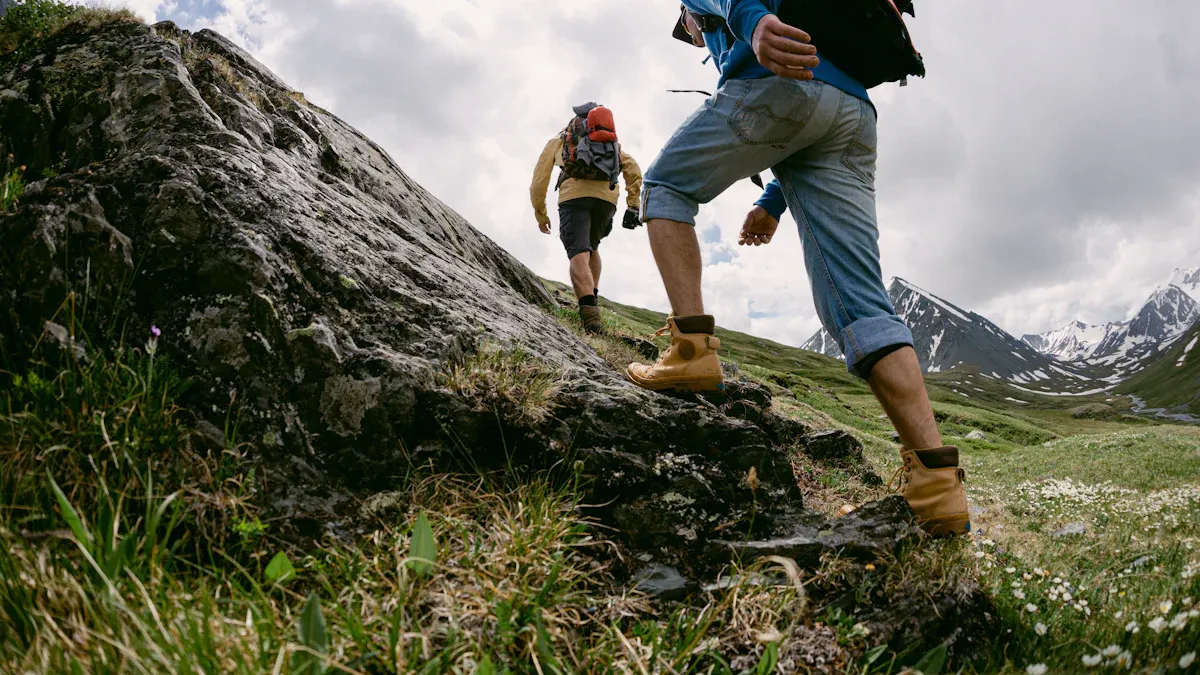How Hiking Every Day Changes Your Body Over Time

You may see your body and mind change if you go hiking every day. Scientists say being outside can make you happier. It can give you more energy. It can also help your brain feel calm. Here is what some studies found:
| Study | Findings |
|---|---|
| Environmental Science and Technology | Outdoor exercise, like hiking, makes people feel happier and more energetic. It also lowers stress and anger. |
| Stanford University (2015) | Spending time in nature while hiking helps the brain relax. It also helps stop negative thoughts. |
Get ready to notice changes you did not expect!
Key Takeaways
- Daily hiking can support weight management and body composition when combined with appropriate intensity and nutrition.
- Hiking strengthens the lower body and core, especially on uneven terrain and inclines.
- Regular hiking improves cardiovascular endurance and walking efficiency over time.
- Spending time walking in nature is associated with reduced stress and improved mood for many people.
- Long-term hiking habits may support heart, bone, and metabolic health when balanced with recovery and strength training.
Physical Changes from Hiking

Weight and Fat Loss
You might notice your pants fitting looser after a few weeks of hiking every day. Many people see real changes in their weight. For example, one person lost about 10 pounds in a month by walking 18 miles each week. Some hikers burn thousands of calories a day, especially on long trails. This can lead to big changes in body shape and fat loss.
| Exercise Type | Fat Loss Effectiveness |
|---|---|
| Hiking | Effective, especially with regular practice |
| Walking | Contributes to weight loss |
| Running | Burns more calories in less time |
Hiking stands out because you use more muscles than you do when walking on flat ground. You also burn more calories when you go up and down hills. Over time, you may find it easier to manage your weight and keep off extra fat.
Muscle Strength
When you hike, your legs do a lot of work. You use your quadriceps, hamstrings, calves, and glutes with every step. Your core muscles, like your abs and lower back, help you stay balanced on rocky paths. Even your upper body gets stronger if you use trekking poles or carry a backpack.
| Muscle Group | Specific Muscles Involved |
|---|---|
| Legs | Quadriceps, Hamstrings, Calves, Glutes |
| Core | Abdominal, Lower Back |
| Upper Body | Back, Chest, Shoulders |
Hiking on uneven ground builds muscle tone in your hips and legs. Going uphill works your glutes and hips. Walking downhill strengthens your quads. Over time, your muscles get stronger and more defined. You may also notice better balance and stability.
Tip: Hiking is a weight-bearing exercise. This means it helps your bones get stronger, too!
Endurance
Daily hiking can turn you into someone who never gets tired on a walk. Your heart and lungs get better at sending oxygen to your muscles. You can walk longer and climb higher without feeling out of breath. Studies show that hiking for several weeks can boost your muscle endurance and physical strength, especially in your lower body.
You may also notice better focus and less fatigue during the day. Hiking helps your body handle stress and recover faster after exercise. Over time, you build up stamina that helps you in other sports and daily life.
Foot and Shoe Size
Have you ever finished a long hike and felt like your shoes got tighter? That’s not your imagination. After walking or hiking, your feet can swell and even change shape a little. One study found that foot volume increased by 2% after just 10 minutes of walking. This means your shoe size might feel different after a long day on the trail.
Some hikers also notice blisters, muscle cramps, or sore feet, especially when starting out. Blisters are the most common foot problem. You can help prevent them by wearing good socks and shoes that fit well. Over time, your feet may get tougher and more used to the trail.
- Blisters and muscle fatigue are common at first.
- Your balance and postural control can improve as your feet get stronger.
- Some people need to buy shoes a half-size bigger after months of hiking.
Note: Pay attention to your feet. Take breaks, change socks, and choose shoes that give your toes room to move.
Other Physical Benefits
You get more than just stronger muscles and less fat. Hiking helps your balance and coordination, especially on rocky or uneven trails. Your metabolism gets a boost because your body works harder to keep you moving. Over time, you may notice you feel more energetic and less tired during the day.
Here’s a quick list of the most common changes you might see after hiking every day for a month:
- Improved mental focus and creativity
- Decreased anxiety and fatigue
- Enhanced muscular fitness
- Increased strength and endurance
- Lowered risk of health conditions like heart disease and obesity
- Better weight management
Hiking every day can change your body in ways you might not expect. You get stronger, leaner, and more balanced. Your feet may even change shape! Most of all, you’ll feel more confident and ready for new adventures.
Mental and Emotional Benefits

Mood Boost
You may feel happier after a few days of hiking. Nature can help you feel better. When you are outside, your brain makes chemicals. These chemicals, like serotonin and dopamine, help you feel calm and happy.
- A Stanford study showed walking in nature for 90 minutes helped lower signs of depression.
- People living in cities have a higher risk of anxiety and mood problems than people in the country.
- Green exercise, like walking in parks or forests, helps you feel better and less upset.
You might smile more and feel less cranky after walking in the woods each day.
Stress Relief
Stress can build up quickly, but hiking helps you relax. Your body lowers stress hormones when you are in nature. Studies show people who walk in green places have less cortisol, which is the main stress hormone.
| Study Description | Findings |
|---|---|
| Hikers in biodiverse riparian zones | Hikers had lower cortisol levels. |
| Walking in nature vs urban areas | Nature walks lowered saliva cortisol more than city walks. |
| Urban dwellers prescribed nature exposure | Cortisol dropped after spending time in nature. |
| Forest bathing meta-analysis | Forests strongly lowered cortisol levels. |
You may feel your worries go away as you listen to birds or watch trees move. Even a short hike can help your mind feel calm.
Better Sleep
Good sleep is important, and hiking can help you get it. Moving your body every day helps you fall asleep faster and sleep better. People who are active say they sleep better. This is true for both men and women.
- Being active each day helps you sleep better.
- On days you move more, you may sleep longer and wake up less.
- Hiking is a low-impact activity that helps sleep, especially for women.
- Exercise programs help people rate their sleep as better, especially older adults.
You might wake up feeling more rested and ready for your day.
Brain Health
Your brain likes walking in nature. Hiking often can help your memory and keep your brain sharp as you get older. Some studies show walking helps your brain work better and may slow memory loss.
| Study Title | Findings | Participants | Methodology |
|---|---|---|---|
| UMD Study on Walking and Brain Connectivity | Walking often helps your brain and memory. | 33 older adults (71-85 years) | Walked on treadmills for 12 weeks, brain scans used |
| High-intensity Walking and Memory | Fast walking helps memory improve. | Older adults who could walk well | Compared walking group to group that did not walk |
You may notice you can focus better, solve problems faster, and remember things more easily. Hiking is good for your mind, too!
Long-Term Health Effects
Heart Health
Your heart gets stronger when you move every day. Hiking makes your heart beat faster, especially when you walk up hills. This helps your heart pump blood better. You also lower your stress, which is good for your heart. Take a look at how hiking helps your heart:
| Benefit | Description |
|---|---|
| Cardiovascular fitness | You boost your heart health by raising your heart rate on hilly terrain. |
| Stress reduction | You lower your stress, which helps protect your heart from disease. |
Blood Pressure
You can help your blood pressure by walking every day. Over time, your numbers may go down. Here are some ways daily hiking helps your blood pressure:
- Regular hiking lowers both the top and bottom numbers of your blood pressure.
- You may see changes after about 10 weeks of steady activity.
- On average, people see a drop of about 5 points in their top blood pressure number every three months.
- The more steps you take, the better your results.
Tip: Try to set a daily step goal. More steps can mean better blood pressure!
Chronic Disease Risk
You lower your risk for many diseases when you walk every day. Hiking helps your body in these ways:
- You cut your risk for diabetes and heart disease.
- Your blood sugar and insulin levels improve, which helps prevent Type 2 diabetes.
- You manage your weight, which keeps your body healthy.
- Walking at least 150 minutes a week meets health guidelines.
Bone and Joint Strength
Your bones and joints get stronger when you walk on trails. The pressure from each step helps your bones grow denser. Here is what happens:
- Regular outdoor walking boosts bone strength and keeps bones healthy.
- Brisk walking or hiking helps women keep their hips and spines strong, especially after menopause.
- Your joints get used to moving, which can help you stay active as you age.
Note: Hiking on uneven ground also builds balance and coordination, which protects your joints.
You get many long-term health benefits from making hiking part of your daily life. Your heart, blood pressure, bones, and joints all get stronger. You also lower your risk for serious diseases.
You gain so much from making time for the trail each day. Your body grows stronger, your mind feels lighter, and your heart works better. Many people notice more energy, better sleep, and a happier mood.
- You might see changes in muscle tone, shoe size, and even how you handle stress.
- Some hikers face challenges like sore feet or fatigue, but starting slow helps.Remember, enjoy each step and celebrate small wins. Your journey brings both quick rewards and lasting health.
FAQ
How long should you hike each day to see results?
You do not need to hike for hours. Even 30 minutes a day can help you feel stronger and happier. Start with what feels good for you. Add more time as your body gets used to it.
Can you hike every day without rest?
You can hike daily if you listen to your body. Take it easy on tired days. Short, gentle hikes count too. If you feel pain or strong fatigue, take a rest day.
What should you eat before and after hiking?
Eat a light snack before you hike, like a banana or granola bar. Drink water. After hiking, choose foods with protein and healthy carbs. This helps your muscles recover.
Will hiking hurt your knees?
Hiking can make your knees stronger, but steep trails may cause soreness. Use trekking poles for support. Go slow on downhill paths. If your knees hurt, rest and try easier trails.
Do you need special gear to start hiking?
You do not need fancy gear. Comfortable shoes and weather-appropriate clothes work well. Bring water and a snack. As you hike more, you might want hiking shoes or a small backpack.
See also
Essential Advice for Completing a 20 Mile Hike in One Day
Complete Gear Guide for a 30 Mile Hike in 2025
Ten Classic Hiking Trails Every Adventurer Should Experience



Comments are closed